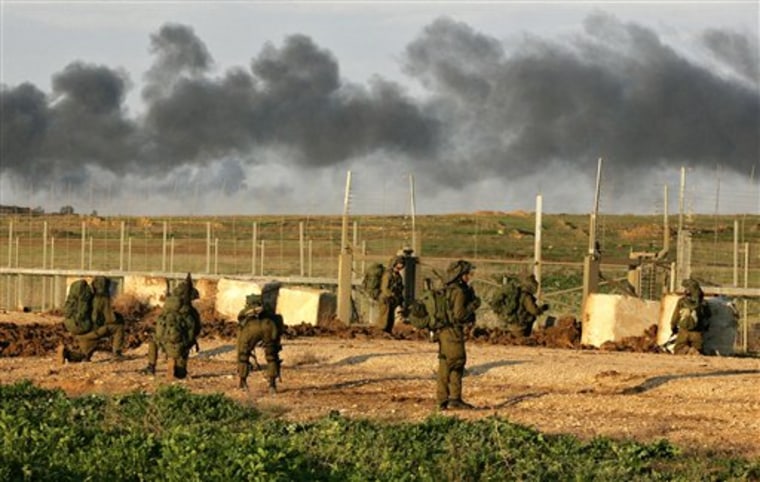Israel says the main goal of its ground offensive against Gaza's Hamas rulers is to end years of rocket fire on its southern towns. But perhaps an equally important, if unspoken, objective is to wipe away the errors of Israel's 2006 war in Lebanon.
That 34-day campaign against Hezbollah guerrillas was marred by hasty decisions and unrealistic expectations. With meticulous preparations and limited aims this time around, the Gaza offensive is meant to restore the army's credibility at home — and its power of deterrence against Arab enemies.
"Things are being done in a much more orderly way," Cabinet minister Isaac Herzog said.
Israel declared war on Hezbollah immediately after the guerrilla group burst across Israel's northern border, killing three soldiers and capturing two. With little debate, the government set out an ambitious agenda: to bring home the captured soldiers safely and destroy Hezbollah.
Rescue effort failed
While Israel dealt Hezbollah a heavy blow, it failed to rescue the soldiers or stop the guerrilla group from raining 4,000 rockets onto northern Israel.
Soldiers returning from the war zone complained of poor training, inadequate supplies and battlefield setbacks, often in real-time interviews from their cell phones. Bomb shelters and warning systems failed, and in a crippling blow, more than 30 soldiers were killed just as a U.N.-brokered cease-fire was about to take effect.
The inconclusive outcome was widely viewed as a failure in Israel, costing the defense minister, military chief and other top generals their jobs and raising questions about the army's toughness. Surrounded by a sea of enemies, Israel relies on military superiority as a cornerstone of its foreign policy.
With that in mind, the military has said a central goal of the ground operation is to strengthen Israel's deterrence — both with Hamas and its other enemies in the region.
"If they want to go for another round, they have to take into consideration the consequences," said one senior commander, who was not permitted to be identified under military guidelines.
In launching the mission, Prime Minister Ehud Olmert, who was accused in a government probe of hasty decision making and "very severe failures" during the Lebanon war, has tried hard to send the message that he learned his lessons.
'Operation was unavoidable'
Olmert's inner Cabinet held no less than six lengthy debates over the operation, most recently on Friday, and he has repeatedly told the public how much he agonized over the decision to send soldiers into harm's way.
"This morning, I can look each one of you in the eyes and say that the government did its utmost before deciding on the operation," Olmert told his Cabinet on Sunday. "This operation was unavoidable."
Olmert also has taken great pains to show that his objectives are limited to stopping the rocket fire — not the far more difficult task of toppling Hamas. Officials have even acknowledged that rocket fire is unlikely to be halted altogether.
While the Lebanon crisis caught the army off guard, Israeli military officials say the Gaza operation was planned for months.
Troops have been preparing for the possibility of a Gaza invasion for the past year and a half, and the operation is making much heavier use of well-trained conscripts, in contrast to the rusty reservists who were thrown into battle in Lebanon.
Troops are better equipped
Troops are also better equipped, though they've been ordered to leave cell phones at home as part of a tighter policy on controlling information.
Most critically, Israel moved quickly to the ground phase of its Gaza offensive. In 2006, it relied heavily on air power until the closing days of the war. The aerial attacks quickly ran out of useful targets, and allowed Hezbollah to prepare for Israel's last-minute ground push.
"We have implemented many lessons form the war in Lebanon. We feel our forces ready and very well trained," said military spokeswoman Maj. Avital Leibovich.
